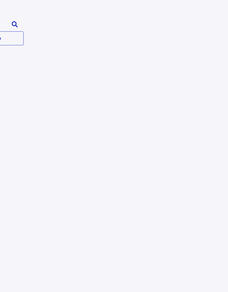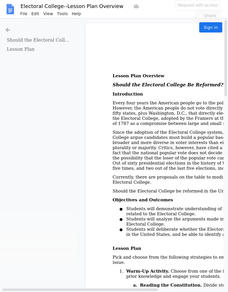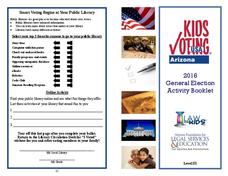Encyclopedia Britannica
Becoming US President
It's that time of year, and the year. Once again the race is on for the White House. It's important that young voters, and would-be voters, understand the process for becoming the United States President. Class members research the...
Heritage Foundation
The House of Representatives
The House of Representatives has a lot of responsibility in the United States government. But how did it all begin, and why is it the way it is now? A comprehensive lesson answers all of these questions about the US Constitution...
Heritage Foundation
The Office of the Executive
An executive is not just a leader of a company; you can also use the term to describe the president of the United States. The ninth part of a 20-part unit teaches high schoolers about the importance of the executive branch and the...
Heritage Foundation
The Senate
Do your learners struggle to understand the differences between the Senate and the House of Representatives? Help them develop an understanding of how the US Constitution's clauses affect the Senate's operations. A high-quality...
Carolina K-12
Exploring the Electoral College
Does your vote really count? This activity helps young voters learn about the electoral college through a TED talk, a helpful handout, discussion prompts, and then a role-playing activity that has participants simulating...
C-SPAN
2016 Electoral College Map
The electoral college can be confusing for citizens of any age. Clear up misconceptions with a handy printable map that details how many electoral votes are allotted to each state, as well as a history of modern elections, complete with...
Carolina K-12
The Electoral College
Put the Electoral College into perspective with a simulation of an election. Scholars experience an electoral vote, participate in an in-depth discussion on the topic, and engage in a congressional committee where they learn about the...
Carolina K-12
The Electoral College
Is the Electoral College the best method of electing the president of the United States? Your young historians will write a persuasive essay discussing the historical perspective of the college, pros and cons, and a final argument...
K20 LEARN
Electoral College: Does My Vote Count?
How can a candidate get the most votes, yet still lose the race for the presidency? This is has happened more than once in American history, including in the elections of 2000 and 2016. Using an activity for creating group notes, young...
K20 LEARN
Slavery in the Constitution
Young historians may be surprised to learn that the Constitution of the United States includes provisions that protect the institution of slavery. Groups examine four clauses of the Constitution, as well as other primary sources, and...
DocsTeach
Election of 1800
The 2020 election is not the only unpredictable one in history. The Election of 1800 highlighted an unforeseen event in a presidential election. The activity reviews documents from the elections and what happened when the electoral...
PBS
PBS Electoral Decoder
Imagine being able to explore all the presidential elections from 1789-2016! Being able to examine the key events, how the states voted, and the importance of the Electoral College in each of the elections! A PBS cartogram makes all this...
National Endowment for the Humanities
A Defense of the Electoral College
Each presidential election year, the debate about the electoral college rages. Michael C. Maibach's "A Defense of the Electoral College" offers young political scientists an opportunity to examine a reasoned argument for why the...
C-SPAN
Electoral College
Most people are surprised to learn that American democracy is not as direct as they thought. Using a package of guiding questions, charts and curated videos, learners unpack the unique American institution of the Electoral College. The...
Encyclopedia Britannica
Electoral College Philosophical Chairs Debate
Because of the Electoral College, it is possible to win the popular vote in a US Presidential election and still lose the election. After researching the pros and cons of the Electoral College, class members engage in a structured debate...
Constitutional Rights Foundation
The Troubled Elections of 1796 and 1800
Congress does more than create new laws. Political scientists delve into the elections of 1796 and 1800 to understand how political parties, the Electoral College, and personal agendas affected the election process. The resource also...
Constitutional Rights Foundation
Slavery and the Electoral College
How did slavery mold the creation of the US Constitution? The final lesson plan in the series focuses on how slavery impacted the creation of the Electoral College. Academics learn how the Electoral College was created because Southern...
Constitutional Rights Foundation
270 Votes to Win: The Electoral College in the United States
What exactly is the Electoral College and how does it work? The lesson is part of a larger series on government that explains what the Electoral College is and how it helps determine an election winner. Academics participate in...
ProCon
Electoral College
The Electoral College's role in elections is sometimes confusing and controversial. Pupils use a debate topics website to research the pros and cons of the practice to debate whether the United States should still use the Electoral...
National Constitution Center
Town Hall Wall: College Exam
The college that directly affects young citizens' lives is not the university they're applying to. Learn about the Electoral College in a town hall activity in which class members debate the merits of the current system versus electing a...
Law for Kids
General Election Activity Booklet
It's never too early to practice smart voting! Gain practice voting in a general election using a booklet compiled of an assortment of activities including a word search, maze, graphing, and more!
C-SPAN
The Electoral College and the Constitution
What is the purpose of the Electoral College? Is it antiquated, or does it have a place in today's political climate? High schoolers view a series of video clips as they analyze the parts of the United States Constitution that address...
C-SPAN
Electoral College Pros/Cons and Alternatives
If every vote counts, why do we need the electoral college? Middle and high schoolers study the Constitutional precedent of the electoral college, as well as its place in historical and modern elections, with an engaging social studies...
Mikva Challenge
The Great Electoral Race Kickoff
Do young people care about elections? Host a discussion about the role of young citizens in the electoral process with an engaging social studies lesson. As high schoolers read and respond to four statements about youth interest in...

























